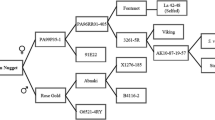Summary
About 25,000 acres are planted to potatoes, annually, in eastern Virginia. New production methods and new high-yielding disease-resistant varieties must be used if the Virginia potato industry is to meet the competition from other states. As part of the National Potato-Breeding Program, Pungo, a rapidly growing, medium-early variety, potentially high in yielding ability and highly resistant to the late blight fungus, was released to growers in 1950. Pungo usually outyields Irish Cobbler and far exceeds it on the Eastern Shore of Virginia in seasons of deficient rainfall.
It compares favorably with Green Mountain in Maine so that it can be produced with profit by certified seed growers. It can be grown in Maine without fungicidal applications but should be sprayed with DDT.
Pungo yields well in several of the southern states. If its tubers grow too large they are inclined to be rough. Closer planting and lighter applications of fertilizer will remedy this condition.
Similar content being viewed by others
Author information
Authors and Affiliations
Additional information
Pungo is the name of a well-known Indian Chief, who lived in Princess Anne County, Va., near what is now a noted shipping point for potatoes called Pungo. Many markets are familiar with potatoes shipped from Pungo, Va.
Rights and permissions
About this article
Cite this article
Parker, M.M., Akeley, R.V. & Stevenson, F.J. Pungo: A new variety of potato resistant to late blight and adapted to eastern Virginia. American Potato Journal 31, 322–326 (1954). https://doi.org/10.1007/BF02861601
Accepted:
Issue Date:
DOI: https://doi.org/10.1007/BF02861601




